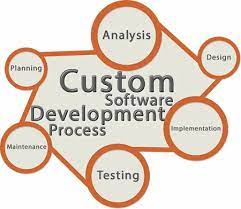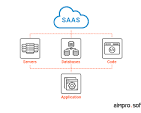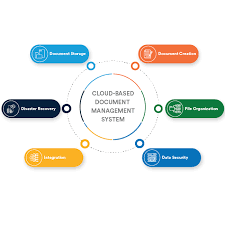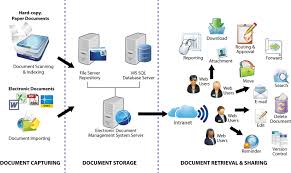Unlocking Business Potential with Customized Application Software
The Power of Customized Application Software
In today’s fast-paced digital world, businesses are constantly seeking ways to stay ahead of the competition and meet the evolving needs of their customers. One powerful tool that has emerged to address these challenges is customized application software.
Customized application software refers to tailor-made programs designed to meet specific requirements of a business or organization. Unlike off-the-shelf software solutions, customized applications are built from the ground up to align perfectly with the unique processes and objectives of a particular entity.
Benefits of Customized Application Software
Enhanced Efficiency: Customized applications streamline workflows by automating tasks and processes specific to your business. This leads to increased productivity and efficiency across all departments.
Scalability: As your business grows, customized software can easily be scaled up to accommodate new users, features, and functionalities without compromising performance.
Competitive Advantage: By having software that is tailored to your exact needs, you gain a competitive edge in the market. Customized applications can help differentiate your business from competitors and attract more customers.
Improved Data Security: With customized software, you have greater control over data security measures and can implement robust encryption protocols to protect sensitive information.
Development Process
The development of customized application software involves several key stages:
- Requirement Analysis: Understanding the unique needs and objectives of the business.
- Design: Creating a blueprint for the software’s architecture and user interface.
- Development: Writing code and building the functionality of the application.
- Testing: Thoroughly testing the software for bugs, errors, and performance issues.
- Deployment: Rolling out the customized application for use within the organization.
In Conclusion
In conclusion, customized application software offers businesses a powerful tool for optimizing operations, enhancing customer experiences, and driving growth. By investing in tailor-made solutions that align with your unique requirements, you can unlock new opportunities for success in today’s competitive landscape.
Understanding Customized Application Software: Key FAQs for Businesses
- What is customized application software?
- How does customized application software differ from off-the-shelf software?
- What are the benefits of using customized application software for businesses?
- How can customized application software improve efficiency in a company?
- Is customized application software scalable as a business grows?
- What competitive advantages can customized application software provide to a business?
- How does customized application software enhance data security compared to standard solutions?
- What is the typical development process for creating customized application software?
- Why should businesses consider investing in customized application software?
What is customized application software?
Customized application software refers to bespoke programs that are specifically tailored to meet the unique needs and requirements of a business or organization. Unlike off-the-shelf software solutions that offer generic functionalities, customized applications are designed from scratch to align perfectly with the specific processes, workflows, and objectives of a particular entity. By customizing the software to fit the exact specifications of a business, organizations can enhance efficiency, scalability, and competitiveness while also ensuring optimal performance and security.
How does customized application software differ from off-the-shelf software?
Customized application software differs from off-the-shelf software in its tailored approach to meeting specific business needs. While off-the-shelf software offers pre-built solutions that cater to a wide range of users, customized applications are designed from scratch to align perfectly with the unique processes and requirements of a particular organization. This means that customized software can be fully personalized to integrate seamlessly with existing systems, automate specific workflows, and address niche functionalities that off-the-shelf solutions may not provide. By opting for customized application software, businesses can gain a competitive edge, enhance efficiency, and achieve greater flexibility in adapting to evolving industry demands.
What are the benefits of using customized application software for businesses?
Customized application software offers a myriad of benefits for businesses seeking tailored solutions to meet their specific needs. One key advantage is the enhanced efficiency that comes from automating workflows and processes unique to the organization, leading to increased productivity. Scalability is another significant benefit, as customized software can easily adapt and grow alongside the business without sacrificing performance. Furthermore, businesses gain a competitive edge by leveraging customized applications to differentiate themselves in the market and attract more customers. Improved data security is also a crucial benefit, allowing businesses to implement robust measures to protect sensitive information. Overall, the flexibility and customization offered by tailored application software empower businesses to optimize operations and drive growth effectively.
How can customized application software improve efficiency in a company?
Customized application software can significantly improve efficiency in a company by streamlining workflows and automating tasks that are specific to the organization’s processes. By tailoring the software to meet the exact requirements of the business, employees can work more effectively and focus on core activities without being hindered by unnecessary features or complexities. Customized applications eliminate manual interventions, reduce errors, and enhance communication among different departments, leading to increased productivity and operational efficiency. Additionally, these tailored solutions can provide real-time insights and analytics that help management make informed decisions quickly, further optimizing business processes and driving overall performance.
Is customized application software scalable as a business grows?
Customized application software is indeed scalable as a business grows. One of the key advantages of customized applications is their ability to adapt and expand along with the evolving needs of a business. With proper planning and development, customized software can be designed to accommodate increased user loads, additional features, and enhanced functionalities as the business expands. This scalability ensures that the software remains efficient and effective in supporting the growing operations of the business, providing a flexible solution that can grow in tandem with the organization’s requirements.
What competitive advantages can customized application software provide to a business?
Customized application software can provide significant competitive advantages to a business by offering tailored solutions that align perfectly with its unique processes and objectives. These bespoke applications enhance efficiency by automating tasks specific to the business, leading to increased productivity and streamlined workflows. Additionally, customized software allows for scalability, enabling businesses to easily adapt and grow without compromising performance. By differentiating the business from competitors and improving data security through personalized features, customized application software helps businesses gain a competitive edge in the market and attract more customers.
How does customized application software enhance data security compared to standard solutions?
Customized application software enhances data security compared to standard solutions by offering tailored security features that specifically address the unique vulnerabilities and requirements of a business. Unlike standard off-the-shelf software, customized applications can be designed with robust encryption protocols, access controls, and authentication mechanisms that align with the organization’s data protection policies. By customizing security measures to fit the specific needs of the business, customized software minimizes the risk of data breaches and unauthorized access, providing a higher level of protection for sensitive information.
What is the typical development process for creating customized application software?
The typical development process for creating customized application software involves several key stages. It starts with a thorough requirement analysis, where the development team works closely with the client to understand their specific needs and objectives. Following this, the design phase begins, focusing on creating a blueprint for the software’s architecture and user interface. Once the design is approved, the development stage commences, where developers write code and build the functionality of the application according to the agreed-upon specifications. Subsequently, rigorous testing is conducted to identify and rectify any bugs, errors, or performance issues. Finally, after successful testing, the customized application software is deployed for use within the organization, ensuring a seamless transition to improved digital solutions tailored to meet the client’s unique requirements.
Why should businesses consider investing in customized application software?
Businesses should consider investing in customized application software for several compelling reasons. Firstly, customized applications are tailored to meet the specific needs and requirements of a business, enabling streamlined workflows and increased efficiency. Secondly, such software can be easily scaled up as the business grows, ensuring seamless integration of new features and functionalities. Additionally, customized applications provide a competitive advantage by differentiating the business from competitors and attracting more customers. Moreover, these applications offer improved data security measures, allowing businesses to protect sensitive information with robust encryption protocols. Overall, investing in customized application software empowers businesses to optimize operations, enhance customer experiences, and drive growth in today’s dynamic market environment.











